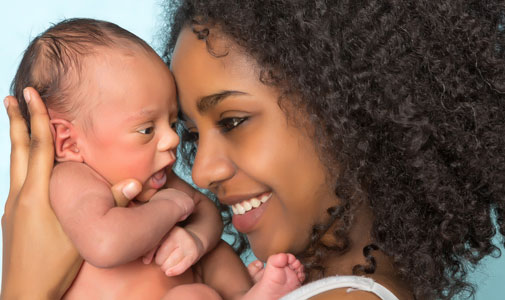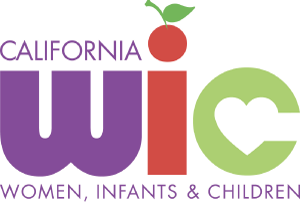
You and your baby It’s important for you and your baby to feel very connected to each other emotionally. This doesn’t happen all at once. This happens over time. Another word for this is “bonding.”
Loving connection Your baby and you feel this loving connection more and more as you respond to her needs:
• when you hold her close to you.
• when you breastfeed her.
• when you talk to her lovingly.
• when you smile at her.
• when you look into her eyes.
• when she’s hungry and you feed her.
• when her diaper is wet and you change her.
• when she’s tired or fussy, and you calm her.
• when she’s sad, and you comfort her.
• when she can count on you.
Your baby and you feel this loving connection to each other:
• when you play with her.
• when you sing to her.
• when you read to her.
You also feel this connection to your baby:
• when you look at her and see how lovely she is.
• when you realize you are giving her what she needs.
• when she looks at you.
• when she smiles at you.
• when she coos at you.
• when you watch her grow and change.
Bonding and breastfeeding You and your baby will feel very connected to each other when you breastfeed. Breastfeeding is important because breastmilk is the best food for your baby. And breastfeeding is important because it helps you and your baby bond.
Dads and babies Dads and babies need to feel emotionally connected to each other too. Dads can do everything that moms can do, except breastfeed!
Dads and breastfeeding Are you the dad? You can learn about the benefits of breastfeeding and what to expect. You can encourage your partner if breastfeeding becomes difficult. You can help her be more comfortable by bringing her a pillow or a glass of water or milk while she’s nursing. You can handle the housework and take care of the other kids so mom can focus on breastfeeding your new baby.
Meeting your baby’s needs Of course babies need to eat, sleep and be warm. They have other types of needs too.
Giving baby a sense of security Your baby will feel safe and secure when she can count on you to give her what she needs. She will feel safe when the people around her are calm, and there aren’t a lot of loud noises.
Paying attention to baby Your baby wants and needs your attention. This makes her feel connected to you and loved.
Responding to baby Your baby will feel loved
• when she smiles at you and you smile back.
• when she coos at you and you coo back.
• when she holds up her arms and you pick her up.
• when she cries and you pick her up.
Holding baby Your baby will feel loved, protected and secure when you hold her. You can pick her up often. There is no such thing as picking her up too much or spoiling her.
Smiling at baby Your baby will know you’re happy with her when you smile at her.
Speaking with a loving voice Your baby knows your voice. She enjoys hearing your loving voice, and feels sad or even scared if your voice isn’t loving.
Showing baby kindness You are kind to your baby when you think about what she needs and help her. Is she too hot in that sweater? You can take it off. Did she drop a toy and start to cry? You can pick up the toy and give it back to her.
Staying calm Your baby needs you to stay calm. When you are calm, she can feel calm too.
Being patient Sometimes your baby will do things you don’t like. She may cry a lot when you’re busy or tired. She may make a mess with her food. She may break something. It is important to remember that babies do these things. They are not being bad. They are just being babies! Don’t punish your baby. Try to stay patient.
Meeting your own needs You have needs too. You need to rest or sleep. You need time with friends and family members. You need to relax and to do something fun.
Baby blues You may feel sad soon after your baby is born. Your sad feelings are probably normal. Many mothers feel this way. These feelings are called the “baby blues.” They usually begin soon after the baby is born and last about 2 weeks. Mothers who have the “baby blues” may also feel a lot of stress.
Do you have the baby blues? If you feel this way, try to remember that these feelings will probably go away soon.
It may help to talk with someone you trust. This person could be your partner, a family member, or a friend. It can help if you have less to do. Put off chores that can wait. Ask for help with the house or with your other children. And accept help if someone offers it.
Depression Sometimes a mother feels very, very sad, and her feelings last more than 2 weeks. This may be post partum depression. Post partum depression is more serious than the baby blues. If you think you have post partum depression, it is important to talk to your doctor.
When you are having problems Sometimes family issues or your own personal problems may get in the way of caring for your baby. You may find it more difficult to be patient or loving towards your baby.
There is help. If you are a new mother who is stressed
• talk to family members and friends for support.
• try to be patient and loving towards your baby, and yourself.
• reach out and find help. Call 211 for help.
When you find ways to meet your own needs, it will be easier to be a kind, patient and loving parent.
Are you a WIC mom? If you are a WIC parent with a new baby, you can find many helpful services at your WIC center.
• You can talk with a WIC educator to learn more about what babies do, breastfeeding and feeding your baby.
• You can ask for referrals to community services.
• You can take part in parent sessions with a WIC educator and other parents. There you can learn tips about breastfeeding, baby behavior, baby nutrition, healthy eating, and ways to avoid childhood obesity. There are other topics too.
• You can join a breastfeeding support group and enjoy getting together with other breastfeeding moms.
• You can meet with a breastfeeding expert if you have a serious breastfeeding problem.
• You can meet with a nutritionist at your WIC center if your baby has a health challenge.
• You can receive helpful food checks for purchasing nutritious food.
Are you a WIC dad? If you’re a dad whose partner, baby or child is a WIC participant, you can take part in any of WIC’s one-on-one counseling sessions, parent sessions and breastfeeding support groups.
Staff at our WIC centers will be happy to provide additional information if you have questions.
WIC is here for you! Read about WIC services here>>


